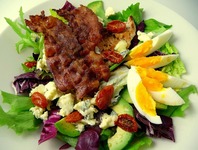 |
| Angelika/Mike Schilli |
|
Michael A good quality steak develops a great intensive flavor if cooked on an open-fire grill. But if you leave it on until it turns dark, German guests will proclaim that the blackened surface causes cancer, send it back to the kitchen, or grudgingly cut around the burnt parts. Interestingly, Americans don't share the same health concerns, and flat-out love their barbecue meat flame-grilled to a point where Germans would consider it burnt.
Take Dave, my colleague at work, for example. He often prepares a lunch sandwich at the cafeteria and leaves the bread in the toaster until it's almost black (Figure 1). When I jokingly comment that he could just as well smoke a cigarette, he vehemently dismisses my claim and when I ask why he's burning his toast, he laughs and says "Because I like it that way!". To understand the irony of this, you need to know that Dave neither smokes nor drinks, because it's unhealthy.
Most Americans develop a fondness for burnt food as early as pre-school. Boy and girl scout groups like to roast fluffy marshmallows over bonfires when they are out camping, until the surface of those sugary sweets turns completely black. Along with a wafer of chocoloate, they're squished between two bisquit halves, and kids just love to eat them. The dish is called a S'more, which allegedly is derived from "Some more" (Figure 2).
Hardly anyone in Germany would be drooling over the partially burnt grilled items in the supermarket flyer in Figure 3. But the question remains, is eating charred food really as harmful as it is believed in Germany? Enjoying burnt items once in a while probably won't do any harm, just as we occasionally eat fried bacon and eggs like when on vacation, although our medically inclined friends would probably be rolling their eyes over this.















